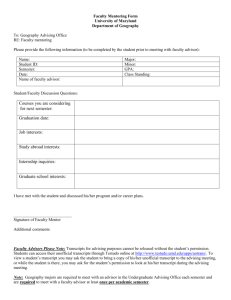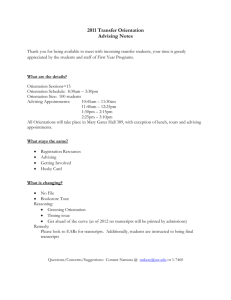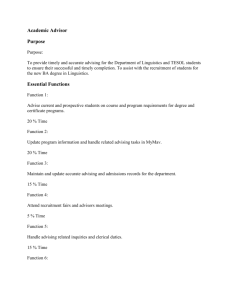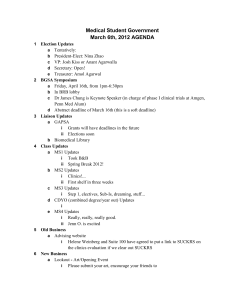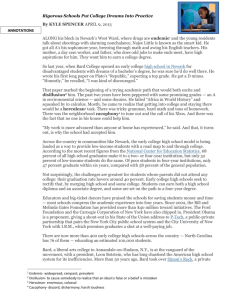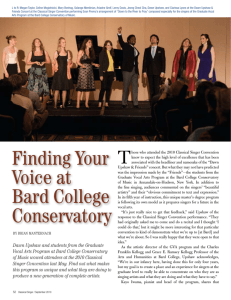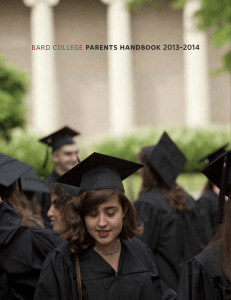GUIDE TO FACULTY DUTIES This list is intended
advertisement
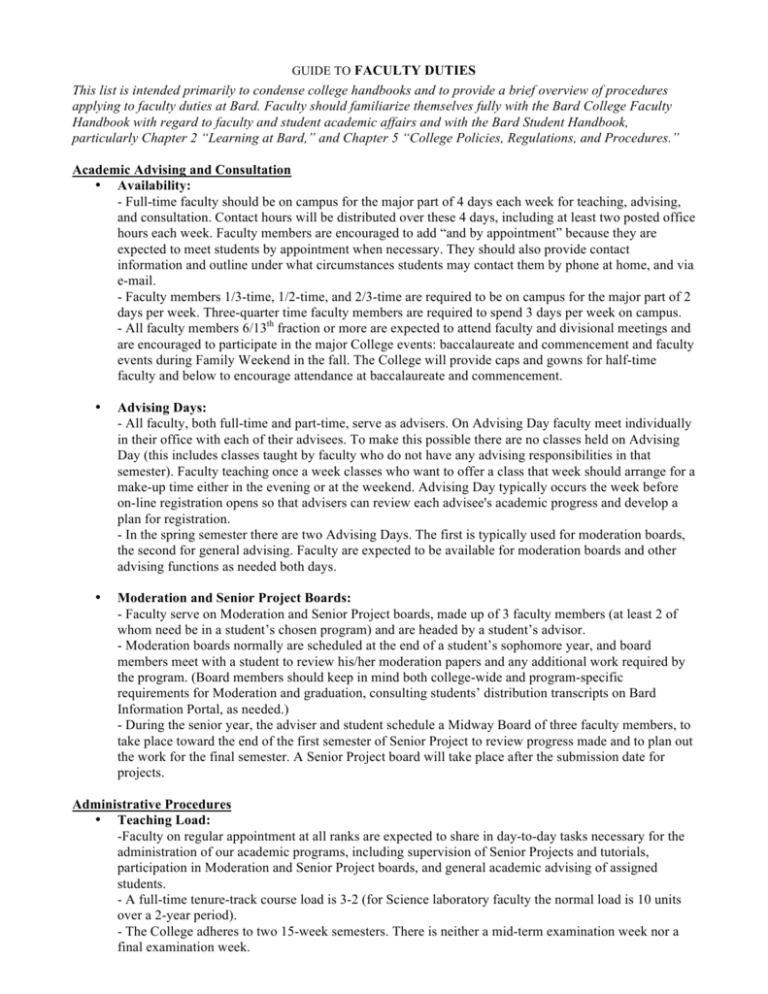
GUIDE TO FACULTY DUTIES This list is intended primarily to condense college handbooks and to provide a brief overview of procedures applying to faculty duties at Bard. Faculty should familiarize themselves fully with the Bard College Faculty Handbook with regard to faculty and student academic affairs and with the Bard Student Handbook, particularly Chapter 2 “Learning at Bard,” and Chapter 5 “College Policies, Regulations, and Procedures.” Academic Advising and Consultation • Availability: - Full-time faculty should be on campus for the major part of 4 days each week for teaching, advising, and consultation. Contact hours will be distributed over these 4 days, including at least two posted office hours each week. Faculty members are encouraged to add “and by appointment” because they are expected to meet students by appointment when necessary. They should also provide contact information and outline under what circumstances students may contact them by phone at home, and via e-mail. - Faculty members 1/3-time, 1/2-time, and 2/3-time are required to be on campus for the major part of 2 days per week. Three-quarter time faculty members are required to spend 3 days per week on campus. - All faculty members 6/13th fraction or more are expected to attend faculty and divisional meetings and are encouraged to participate in the major College events: baccalaureate and commencement and faculty events during Family Weekend in the fall. The College will provide caps and gowns for half-time faculty and below to encourage attendance at baccalaureate and commencement. • Advising Days: - All faculty, both full-time and part-time, serve as advisers. On Advising Day faculty meet individually in their office with each of their advisees. To make this possible there are no classes held on Advising Day (this includes classes taught by faculty who do not have any advising responsibilities in that semester). Faculty teaching once a week classes who want to offer a class that week should arrange for a make-up time either in the evening or at the weekend. Advising Day typically occurs the week before on-line registration opens so that advisers can review each advisee's academic progress and develop a plan for registration. - In the spring semester there are two Advising Days. The first is typically used for moderation boards, the second for general advising. Faculty are expected to be available for moderation boards and other advising functions as needed both days. • Moderation and Senior Project Boards: - Faculty serve on Moderation and Senior Project boards, made up of 3 faculty members (at least 2 of whom need be in a student’s chosen program) and are headed by a student’s advisor. - Moderation boards normally are scheduled at the end of a student’s sophomore year, and board members meet with a student to review his/her moderation papers and any additional work required by the program. (Board members should keep in mind both college-wide and program-specific requirements for Moderation and graduation, consulting students’ distribution transcripts on Bard Information Portal, as needed.) - During the senior year, the adviser and student schedule a Midway Board of three faculty members, to take place toward the end of the first semester of Senior Project to review progress made and to plan out the work for the final semester. A Senior Project board will take place after the submission date for projects. Administrative Procedures • Teaching Load: -Faculty on regular appointment at all ranks are expected to share in day-to-day tasks necessary for the administration of our academic programs, including supervision of Senior Projects and tutorials, participation in Moderation and Senior Project boards, and general academic advising of assigned students. - A full-time tenure-track course load is 3-2 (for Science laboratory faculty the normal load is 10 units over a 2-year period). - The College adheres to two 15-week semesters. There is neither a mid-term examination week nor a final examination week. • Class Periods: - 100-level classes meet a minimum of 2 days each week for two 80-minute sessions. - 200-level classes meet 2 days each week. Studio classes may meet once per week for 3 hours. - 300 & 400-level seminars meet a minimum of 1 day each week for 2 hours 20 minutes. 300-level courses with enrollments of over 15 should meet twice each week for 80 minutes. Only moderated, Upper College students should be enrolled in 300- and 400-level seminars. - Wednesday afternoon classes should conclude by 4 p.m. to allow for Divisional and Faculty meetings. • Course Materials: - Faculty have the option of ordering books from the campus bookstore, setting up ReserveWeb through the Library, and placing materials on Library Reserve for their courses. - At the beginning of a course, faculty should distribute syllabi to all students and make clear their expectations about attendance/absences, exams, and written work, such as format, citation style, and submission dates. - We encourage the discussion of the role of academic honesty in a liberal arts curriculum and the respect of college facilities and library materials. Faculty members should direct students to the Academic Resources Center website: http://inside.bard.edu/academicresources/resources/. • Grade Sheets and Criteria Sheets: - Both should be submitted by the registrar’s deadlines at midterm and at the end of the semester. Faculty new to Bard should discuss grading practices and practices for writing criteria sheets with experienced colleagues early in the term. (The Dean of the College will circulate a table of grade distribution by department to program chairs every term.) - Graded work should be returned to students promptly while it still has pedagogical significance. Students should have some sense of their progress in a course prior to mid-term. Students in serious difficulty should be referred to the Dean of Studies. - Criteria sheets with substantive comments must be submitted for all courses at mid-term and term’s end. They are especially important to the Faculty Executive Committee when deciding a student’s academic standing and helpful to faculty and deans in following a student’s progress and writing letters of recommendation. They are also helpful to the Financial Aid Review Board. - Incompletes are given only in cases of medical emergency or other extreme circumstances. Faculty must submit a brief written statement to the registrar in such cases before an Incomplete grade may be granted. - The grades of A+, D+, and D- do not exist at Bard College. -Students must get permission of the faculty to take a class pass/fail. Form available at the registrar’s office must be signed by the faculty member and submitted by the student within the add/drop period. • Cancelled Classes: - Faculty who are unable to be on campus for a class session should contact their colleagues to arrange coverage for the session. If a colleague cannot cover a class, the registrar should be notified about the cancellation, and the cancelled class made up as quickly as possible at times that do not unduly interfere with the other demands on students’ time. - Obligations that require extended absence should be discussed in advance with the Dean of the College. - Cancellation of classes immediately prior to or following a vacation almost always places unfair pressure on other colleagues to do the same, and should occur only in an emergency. • College Policies: Faculty members are particularly encouraged to familiarize themselves with the College policies on the following: - Plagiarism and Academic Dishonesty (Student Handbook, p.183) - Drug and alcohol use (Student Handbook, pp 218) - Sexual harassment (Faculty Handbook, Appendix A) - Faculty Evaluation Document (Faculty Handbook, I.C) - AAUP Contract (Faculty Handbook) - Course Descriptions (http://inside.bard.edu/academic/courses/current/) - Bard College Catalogue (March 2011)


